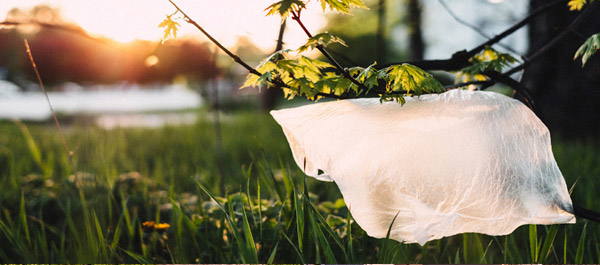
A Clean Water Act Perspective
July 14, 2022
Earth Day: 50 Years Later
January 14, 2023Bag Bans and Beyond

What’s Coming
As NJ could follow NY’s recent plastic ban, the global fight against plastic will take much more.
In the US, 94% of tap water contains microplastics. Worldwide it’s 83%. About a third of fish in the oceans contain them. Ten million tons of plastic enter US landfills each year, while eight million tons enter the oceans globally. At this rate, plastic will outweigh fish in the ocean by 2050. Meanwhile, lobbyists push lawmakers against reductions in single-use plastic.
The fight to stem our planet’s plastic crisis is multifaceted. At the individual level, we can filter our drinking water and be less wasteful with single-use plastics. At the local, state, and national level, companies and governments must take action.
Laws to reduce plastic waste are becoming more common, and they represent an important step in cutting pollution and illuminating the issue. But to solve this issue on the global, long-term level, we will need much more: the realization of a “circular economy” where waste is continually recycled.
Let’s take a look at these efforts, beginning with recent legislation to ban plastic.
New York State Plastic Bag Ban
On March 1st, 2020, NY banned the use of all plastic carry-out bags. Prior to this law, the state was trashing 23 billion plastic carryout bags per year.
The law allows NY counties or stores to offer paper bags at a 5¢ fee. If a county imposes the fee, 2¢ goes to the county and 3¢ goes to the state’s Environmental Protection Fund. If a business opts for a fee in a county without one, then the business keeps the 5¢.
In 2019, New York City banned polystyrene (styrofoam) containers and introduced legislation (still pending) on a plastic-straw ban.
New Jersey Proposed Plastic- and Paper-Bag Ban
NJ legislators introduced a bill in January to ban plastic and paper carryout bags as well as styrofoam containers, with plastic straws allowed upon customer request.
On March 5th, the State Senate approved the bill. However, the State Assembly and Gov. Phil Murphy have indicated they are unwilling to ban plastic and paper bags simultaneously. A similar bill failed in 2019.
Separately, 10 NJ municipalities (most recently Asbury Park) and one county (Camden) have passed plastic bans.
Bans Across America and the Globe
Six US states have passed bans on plastic use: NY, CA, OR, VT, CT, ME. In others, over 100 cities and municipalities have taken action. Contrarily, 17 states have “preemptions” that outlaw such bans.
Many countries are taking action. The UK has a plan to eliminate plastics by 2043. Kenya has fines of up to $38,000 for those caught with single-use plastic bags. South Korea has had a country-wide ban since January, 2019.
Bans vs. Fees – California’s ban led to a 40M lb reduction in plastic shopping bags but a 12M lb increase in purchased trash bags, because many people had previously reused the shopping bags. Reused plastic carryout bags offset plastic in other products, so many environmental groups argue for bag fees instead. Los Angeles saw a 94% reduction in single-use bags after implementing a 10¢ fee, Washington D.C. saw a 50% reduction for a 5¢ fee.
All these laws are steps in the right direction, but even without carryout bags, plastic abounds.
So what’s the ultimate solution?
Perhaps a more sustainable economy. The March 2020 cover of National Geographic reads “The End of Trash,” featuring an article on a possible world where no resource is wasted and all is cycled back– reused, recycled, or composted.
Communities in Scandinavia are leading the way. A facility in Copenhagen incinerates trash for energy and filters the smoke to eliminate air pollution. An office park outside Amsterdam called Park 20|20 has achieved a small-scale circular economy, proving its viability.
Some of these innovations also yield cost savings. For others, the cost is a hurdle. For example, compostable plastics are far less harmful but more expensive to produce and utilize than conventional plastics. To remove plastics already in our world, nature itself can help. There are wax worms and mealworms that eat plastic and convert it into organic waste. Newly discovered microbes can degrade plastics in days that normally would take hundreds of years to decompose.
A zero-waste world is possible. It may seem like a “drop in the bucket” or against social norms, but in order for our planet to survive, we will need to change how we live. Your choice to take this issue seriously means one more person turning the tide toward large-scale change and a plastic-free world.



